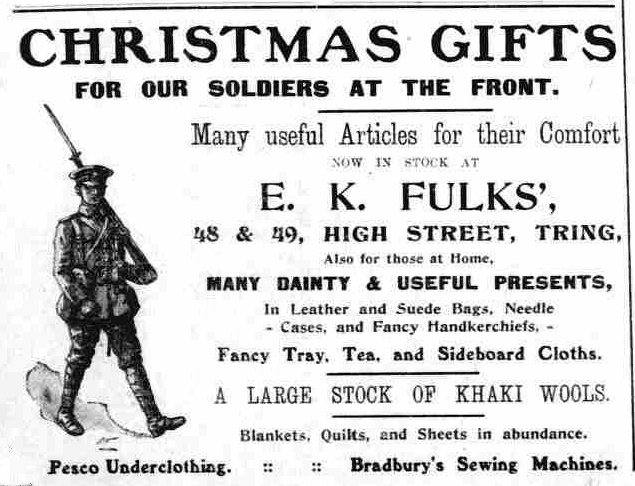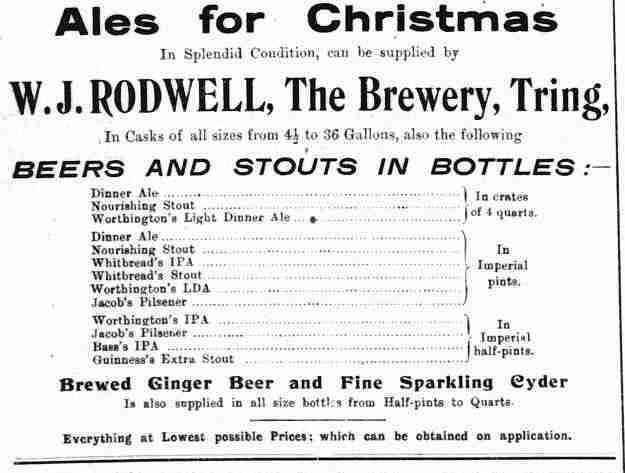|
Tring in War Time, 1914-1919 |
|
Extracts from the Bucks Herald of 5th December, 1914
Edited from British Newspaper Archive
Previous week ~~~~ Tring News Index ~~~~ Next Week
|
TRING IN WAR TIME OUR ROLL OF HONOUR. The following names of men, members of Tring families, have not been included, our previous lists of men serving with His Majesty Forces. Arthur Boarder. 15th Middlesex. Oliver Bevir,
H.M.S. Defence W. H. Clarke, Herts Territorials. D Gregory Connell. Oxford Light Infantry. George Crawley. Oxford and Bucks I. Horace Crawley. Herts Territorials. John Collins. Herts Territorials. A. E. Claridge. Army Service Corps Jesse Dewer,
Oxford and Bucks L.I. Sidney Eggleton. Army Service Corps. William Foster. Yorks L.I. . Harold Foster. King's Own Liverpool Hubert French. Canadian Contingent. Guy Fenton. Lieut.. R.H.A. Herbert Gates. Herts Territorials Frank Arthur Grange. Lieut.. R.A.M.C. Charles Gregory. Driver R.A Walter Keel. Canadian Contingent. Herbert Keen. Frederick Parslow. W Parnell. R.N. Cuthbert Pope.
R.N. Charles Rodwell,
Herts Territorials Eric Read. A.S.C. Arthur John Rawlins R.E. Fred Rodwell. Bucks Territorials Albert Smith. Rifle Brigade. Leonard Snow. Pioneer Brigade. British E. Africa. Arthur Stratford. Bedfordshires. Ernest Seabrook. Herts Territorials. Edward Tidswell. Capt. James Henry
Welling. R.F.A. Arthur Underwood,
Lance-Corpl., Bedfordshires J. J. E. Wade. R.F.A. Harold F Willcocks. Lieut., R.F.A. Edward Wells.
Royal Marines. George Wilkins.
|
THE HERTS TERRITORIALS AT THE FRONT, Great Deeds by the County Regiment. Among the Territorials active service : probably none are doing finer work than the Hertfordshire Regiment, commanded by Lord Hampden. A few days ago it became known that they had distinguished themselves, and it now transpires that they have done even better. For 16 days they held important and vital point the borders of Belgium, and for 24 hours last week-end they brilliantly resisted the determined and repeated effort of the Germans to break through their line. This gallant work won for them high praise official quarters. You have held the trenches against great odds, and your performance will long be remembered in the annals of the British Army. According to Colour-Sergeant Hardy, a letter received yesterday, these were the cheering words of the General in command on Sunday week to the regiment when ordering them rest for four days, their places being taken by French Troops. Al1 reports received show that the regiment displayed great gallantry in the face of great odds end terrific artillery bombardment. They have not come through scathless. as they have lost 15 killed and 35 wounded, 4 seriously. The full list has not yet received, but among the known wounded are: Lieutenants Boyd (injured hack) and Hunt (shock). Private Capel (Kimpton), F. Brockett (Hitchin). L. French (Hitchin). T. Foster (Hitchin). W. Wilkinson (Letchworth), A. Garner (Letchworth). Corporal Broadman (Letchworth). Lance-Corporal T. Weston (Royston). Private B. Kent (St. Albans), Sergeant C. Garment (St. Albans). Private E. Brown (Hertford'), Corporal Kettle (Watford), and Privates Reid. Castle, and O'Brien. The men conducted themselves bravely the trenches. Even under the heaviest cannonade they were whistling and singing. "The officers," says one writer, "are the finest the Army. They do all they can to make things easy for us, and some have gone without their meals in order to we got ours. "We were two days without water, and the officers shared their bottles with the men. "For six days were only yards from the enemy." Sergeant Langford and the regimental doctor had a trying experience. When retiring from the trenches they found the roads cut into huge holes and 3ft. deep in mud and water. The ambulance waggon and horse fell into one of the holes, and for several hours the sergeant and doctor worked amid terrific rain of shells, ultimately succeeding in saving both horse and waggon. The weather was bitterly cold and wet on Thursday when the regiment were to move back into the trenches. The Prince of Wales and Sir John French visited the headquarters and thanked the regiment for their splendid example of patriotism. |
|
The following extracts from letters, which w are permitted to print, give a graphic idea of what being in the fighting-line means: |
|
|
With the First Hertfordshire Regiment, Lieut G. Macdonald Brown, writing home, says:- You will probably see in the papers that we have been in action. We did quite well, and stood our ground against the Prussian Guard, who were being strongly supported by much "Jack Johnson." The men are keeping in very good spirits, although there is good deal of temporary sickness, like swollen and sore feet etc. I think all the Tring and district men are very tit and well except Corporal Barber, who had to fall out the march well within our lines, and is probably in one of the hospitals. The. need for every man possible is more than apparent out here, and absolutely no man who is fit ought under any pretext to be out of it. A few British people ought come to Belgium to see what it really means to invaded. Hardly a home standing, and the people huddled into barns and other places with nothing but what they stand up in. The Brigade to which we are attached are awfully fine lot. and frightfully happy, and have had rest till now since the beginning of the war. The town where we are is being shelled night and day, but one never seems particularly interested in it. The report the huge German losses is quite true. I am sure, because our army simply mow the men down in enormous quantities. The German snipers are really wonderful, and they are on you directly. I was taking supplies to our trenches the night before last; I stopped a minute to turn the carts round, and the snipers started at once, all round apparently, although it was very dark night. The Battalion has had some quite sharp engagements, and I am sorry to say some losses, but not excessive.
|
Sergt. Sydney Tite writes:- At present are renting in a quiet little village, and I have managed to drop into very comfortable billet for a few days while we re-fit. We have had a week in the firing line - rain and cold every day, feet wet all the time, very little sleep; guns booming in our ears night and day; so you may guess few days' rest is very necessary, and more than acceptable. We have had a few casualties, but so far I have managed to dodge shrapnel and "Jack Johnsons," although I am sorry to say one of the latter settled three of our chaps, and performed the funeral rites at the same time. However, we have had nothing but praise for our work, and at any rate have proved that Territorials are something besides "Saturday-night soldiers." The French people in all the villages are very good, and will do anything for us. Had about thirteen hours in a very comfortable bed last night, and am off again in few minutes. (It is not yet 9 p.m.) We are as comfortable and well provided for as it is possible to be under the circumstances, and so far exposure to the elements has not seriously affected my health. I do not seem to be able catch a "rotten cold" now,. which, as you know. I manage easily enough in England. Generally speaking, we do very well for grub, hut miss good cup pof tea very much. Am going to try and teach my landlady to make it in the English way. Here they have beer for breakfast and dinner; no tea,. and coffee with cognac for supper.We get tea served regimentally without milk, and that useful commodity seems very scarce in this part of the country. The beer here is not like the English article - a very flat stuff not worth drinking, and we get rum served the Regiment to keep colds off. It is very funny stuff, and I cannot say I cotton to it much, but I believe it is a good thing to ward off influenza, etc., so take it when it comes my way. Now, do not worry about me. We are now be "dished up" with gloves, mittens, scarves, fur waistcoats, woollen pants and vests, and sundry other articles to protect against the weather, which, by the way, is now rather severe. Have had two or three days of very sharp frosts, and some snow. Au revoir. Hope to see you all shortly after Xmas, if not before. |
|
THE BELGIAN REFUGEES. The following interest account of what has been attempted in Tring is copies from the December number of the Tring Parish Magazine:- "It is now three weeks since w« welcomed the Belgium refugees. Monsieur and Madame Rayée and their six children toTring. and an account of their cominy will be interesting .to those who have not heard it. Monsieur Rayée has a flourishing business in Ostend,. and when Antwerp fell into German hands sent his wife and younger children to England, he himself and his elder daughters staying on to see if anything could be saved out the general ruin. They eventually left by the last boat, after having spent two days and nights on the quay without food or shelter for fear of losing their place in her. As they left the pier the first German troops entered the town. "In the meantime we were thinking that Trimg was very behindhand in offering hospitality to any of these unfortunate people. A small committee of ladies was got together to consider what steps should be taken, with the result that an empty house in Park Road was secured and entirely furnished free of cost by the Committee who also agreed find enough money to support a family of eight or nine people for three months. The next thing was a visit to London to the Skating Rink at Aldwych. where the refugees are received by the London Committee until hoimes can found for them. The very day this important step was taken. Monsieur Rayée, much against his will, had been driven to ask for help. It was a good day for him and for us. This was a family well suited to the house, and Madame Rayée was anxious get the children away from London into the country air. The offer of a home was gladly accepted, and the whole family, with the addition of a nephew, who appeared at the last moment, came to Tring. The tired little party was much cheered when at their journey's end they found a bright fire and a most inviting tea awaiting them. And so a small number of these unhappy people who have lost home and country are settled among us." |
 |
|
|
|
|
December 2014 |
Page Created |


